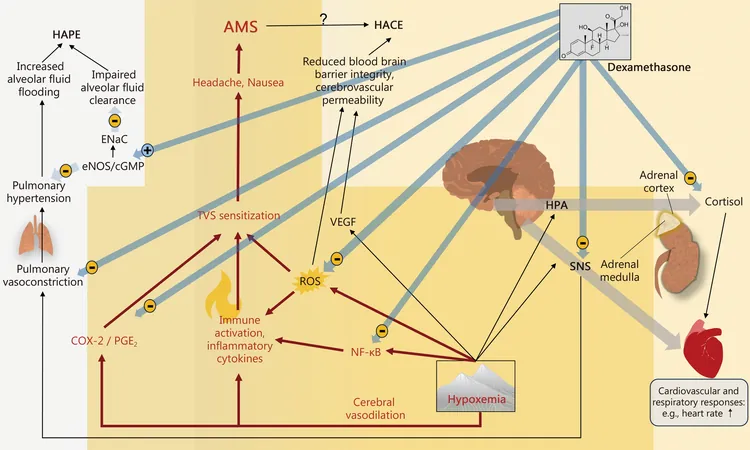
Unlocking the Secrets: How Dexamethasone Could Save You from Altitude Sickness!
2025-08-11
Author: Jacob
The Quest for High-Altitude Survival
As adventurers ascend heights over 3,000 meters, they often confront the perilous conditions of acute altitude illnesses like Acute Mountain Sickness (AMS), High-Altitude Cerebral Edema (HACE), and High-Altitude Pulmonary Edema (HAPE). A compelling review dives into the promising role of dexamethasone (DEX) in combating these treacherous conditions.
Literature Review: What the Studies Say
A comprehensive literature search covering databases from PubMed to Cochrane highlighted 197 articles, where only 13 met strict inclusion criteria for assessing DEX's effects on altitude sickness. These studies evaluated the impact of varying DEX dosages and administration times during ascent scenarios, both simulated and actual, above 3,000 meters.
Dexamethasone: A Powerful Ally?
Among the studies, a notable finding was that of the 11 trials examining DEX’s preventive potential for AMS at altitudes exceeding 4,000 meters, 6 reported significant success, with 5 showcasing large effect sizes—indicating DEX can dramatically decrease the chances of falling ill at high altitudes.
Success Stories: How DEX Stands Against AMS
In a double-blind crossover study at 4,570 m, young men treated with DEX at doses of 4 mg every 6 or 12 hours significantly reduced symptoms compared to the placebo group—showing average AMS-C scores of 0.26 vs. 1.09 (P < 0.05)! Another larger study even compared DEX with the widely known acetazolamide and revealed DEX's superior effectiveness—only 25% of the DEX group experienced AMS compared to a shocking 77% in the placebo group!
Unraveling DEX’s Mechanisms
So, how does dexamethasone fight altitude sickness? DEX is believed to counteract the hypoxia-induced mechanisms that lead to AMS, HACE, and HAPE by reducing inflammation and protecting cerebral integrity. This steroid's anti-inflammatory properties may prevent the swelling or disruption of blood vessels in the brain—key factors during high-altitude exposure.
Cognitive and Physical Performance: Does DEX Help?
Beyond merely preventing sickness, there's intrigue surrounding DEX’s role in sustaining cognitive and exercise performance in high-altitude conditions. Some studies suggest that it may alleviate declines in aerobic capacity during strenuous activities at high elevation, providing yet another compelling reason for explorers to consider its use.
The Dark Side: Potential Risks of DEX
Despite its benefits, caution is warranted. While side effects from short DEX courses are minimal, potential mental disturbances and euphoria should not be overlooked. It’s essential for high-altitude adventurers to be aware of these risks while seeking to leverage DEX as a tool for survival.
Final Thoughts: The Future of DEX in High-Altitude Medicine
As the quest continues for effective measures against altitude sickness, dexamethasone stands out as a promising candidate. Its mechanisms offer fascinating insights that could revolutionize high-altitude health strategies. Future studies must refine dosage, explore broader demographics, and enhance our understanding of DEX's role in cognitive performance at dizzying heights. With proper application, DEX could indeed become your ultimate ally in conquering the peaks!









 Brasil (PT)
Brasil (PT)
 Canada (EN)
Canada (EN)
 Chile (ES)
Chile (ES)
 Česko (CS)
Česko (CS)
 대한민국 (KO)
대한민국 (KO)
 España (ES)
España (ES)
 France (FR)
France (FR)
 Hong Kong (EN)
Hong Kong (EN)
 Italia (IT)
Italia (IT)
 日本 (JA)
日本 (JA)
 Magyarország (HU)
Magyarország (HU)
 Norge (NO)
Norge (NO)
 Polska (PL)
Polska (PL)
 Schweiz (DE)
Schweiz (DE)
 Singapore (EN)
Singapore (EN)
 Sverige (SV)
Sverige (SV)
 Suomi (FI)
Suomi (FI)
 Türkiye (TR)
Türkiye (TR)
 الإمارات العربية المتحدة (AR)
الإمارات العربية المتحدة (AR)